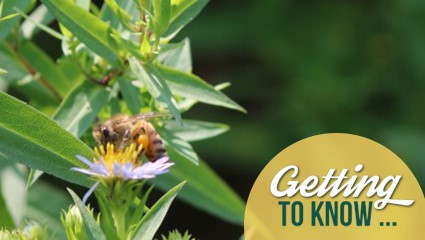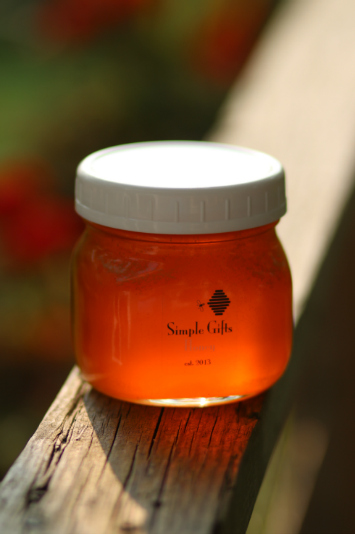Matthew Seeger, dean of the College of Fine, Performing and Communication Arts, has a keen eye for the arts — and, as it turns out, honey. Seeger, who is a beekeeper, or apiarist, by hobby, has a special appreciation for honeybees.

In addition to providing family and friends with honey, Seeger’s sweet hobby offers a safe habitat for bees. These important pollinators are facing dramatic population declines. While the reason behind the honeybee’s declining population is difficult to pinpoint, Seeger cites a combination of factors, including loss of habitat and food sources, use of pesticides, and the invasive varroa mite.
“I remember quite vividly as a kid that there were honeybees everywhere. Now, there are essentially no wild honeybees,” Seeger said. “I felt a bit of an obligation to do what I could to help them.”
Seeger’s hobby developed after a family member — also a beekeeper — had to relocate one of her hives to his yard. Seeger maintained that hive, which eventually flourished into a community that averages about five or six hives, depending on the season. Each hive contains hundreds of thousands of busy bees.
“The bees are typically well-behaved, and there’s been no significant issues,” he said. “When you first open a hive to extract honey and you have 5,000 agitated honeybees flying around you, it can be a little bit disconcerting. Pretty quickly, though, you get used to it.”
For Seeger, tending to the hives includes capturing and relocating bees when a hive grows so large it splits (an event known in the apiarist community as swarming), and extracting honey twice a year. To protect himself when working with the hives, Seeger wears a beekeeping suit and uses a smoker, a tool that calms the bees with small puffs of smoke that interfere with their pheromones.

Once extracted, the honey is filtered and strained. With the help of his wife, Seeger then stores and packages the honey into smaller containers, which they give as gifts.
“The honey’s color and taste do change from time to time because it’s made up of different flowers,” he said. “It’s very different than the highly processed honey you’d buy at the grocery store, and our friends and family really seem to enjoy it.”
Beekeeping is primarily a summer hobby for Seeger, which fits his busy schedule. His bees are from a locally adapted strain call Michigan “survivor bees,” which survive in cold weather. Bees do not hibernate, Seeger noted; instead, they eat the honey they have stored — up to several hundred pounds — and use it as an energy source to agitate their wings and create heat. The bees cluster in the hive, and even in a cold Michigan winter the cluster will stay close to 90 degrees.
“The hive is like a little, self-sustained heat engine,” Seeger said. “As the beekeeper, you’ve got to really be thoughtful about how much honey you take out of the hive in the winter because you don’t want to tap into those reserves.”
While Seeger’s bees are generally resilient, he said that a significant die-off is still typical during the colder months. “It’s common now for beekeepers to lose half their hives each winter.” Despite that challenge, Seeger sees great value in supporting locally adapted bees because they help pollinate major crops throughout the state, such as blueberries and apples.
“More industrial-based beekeeping systems keep their bees in warmer climates during the winter and then transport them across the country for pollination in the spring,” Seeger said. “This kind of system is problematic because almost all of the bees in the United States are from just one or two strains.”
While he considers himself a casual hobbyist, Seeger is a passionate advocate for honeybees, and he encourages everyone to consider small ways they can help support the environment.
“In our society, for example, a dandelion is considered a pest. They’re a very, very important food source to bees, though,” he said. “Even small changes to the way we plant and maintain their yards can make a difference.”